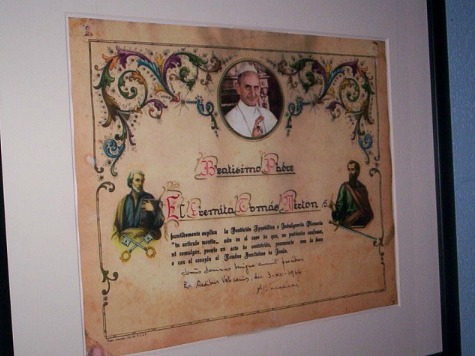As of December 31, 2014, the shops around Vatican City willno longer be selling the familiar parchmentblessings from Pope Francis. In a letter dated April12, 2014, Msgr. Konrad Krajewski, the Pope’s Almoner–or distributor of alms–announcedthe termination of a running agreement between the Vatican and local shops andbookstores to sell the parchment blessings.
Since the pontificate of Leo XIII (1878-1903), the Vaticanhas allowed the saleof parchments conveying papal blessings, stamped with the papal seal andsigned by the Pope’s almoner. These scrolls are regularly purchased as giftsfor weddings, anniversaries, birthdays, and other special occasions.
In his letter, Krajewski acknowledges that historically theVatican enlisted the collaboration of shops and bookstores to allow asmany pilgrims as possible to obtain the blessings. This practice becamecommon in the Holy Year (1950) to make it possible for the ever-growingnumber of pilgrims coming to Rome to receive a blessing. But sixty years agothere was no internet and the small Vatican office was having difficultyphysically dealing with all the requests that came through. Thanks to the efficiencyof today’s internet, this mediation has become superfluous and thescrolls can be ordered onlineand shipped anywhere in the world.
The Vatican has always taken pains to insist that the spiritualCatholic theology prohibits the selling of spiritual goods as a sin, called “simony,” namedafter Simon the Magician who wanted to buy the Apostles’ power of healing formoney (Acts8:18-19). Still, much confusion abounds since the typical pilgrim or touristsimply sees the blessings on sale.
Moreover, 2017 marks the 500th anniversary of theposting of Martin Luther’s “95 Theses,” whichcriticized the Church’s saleof indulgences, sparking the Protestant Reformation. It seems somehowappropriate to avoid any misperception of where the Church stands on thisquestion today.
There is another reason for this change in policy as well.The Vatican intends to see a greater share of the revenue from the parchmentsgoing directly to the poor. At present, parchment blessings usually run between10 and 50 euros each. Of this, only3 euros per scroll go to the Office of Papal Charities–the historicinstitution entrusted with exercising charity to the poor in the name of the Pope–forthe signature and stamp. Pope Francis has decided to stop this, concluding aprocess that began four years ago during Benedict XVI’s pontificate. From nowon, all the proceeds from the blessings will be directed to the poor.
But shopkeepers are standing up to the change, despite aninitial warning that was sent a few years ago and the official letter issuedlast April. The parchments sold directly by them bring in an estimated 15,000to 20,000 euros a month, with less than a third of that sum making it tothe poor. All the rest is profit that goes into the vendor’s pocket.
Approximately50 shopkeepers who sell the scrolls have written a letter of protest to thePope.
Photo Credit: Flickr/Jim Forest

COMMENTS
Please let us know if you're having issues with commenting.